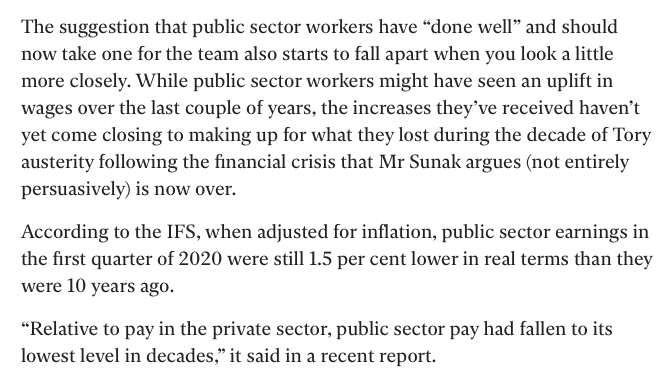
The vaccine passports debate is a perfect illustration of my new working theory: that the most important part of modern government, and its most important limitation, is database management. Please stick with me on this - it's much more interesting than it sounds. (1/?)
Throughout the pandemic, to a rough approximation, every single UK policy success has been built on a good database. And every single policy failure has resulted from a bad/nonexistent one.
The furlough scheme? PAYE. Expanding UC? The UC database (duh). The vaccine rollout? NHS patient records. All robust enough for use, and mostly already transferred to the cloud so could be accessed/expanded without too much stress.
Now think about where things went wrong. Covid test results being lost because the data had been cobbled together using Excel? bbc.co.uk/news/technolog… Track and Trace, where you were essentially trying to build a database mapping the infected's social networks from scratch?
Essentially, a policy is easy to do if you can adjust an existing database easily, and almost impossible to do if you can't. This of course plays into the debate over the £20 UC uplift - proposed solutions essentially divide into computer says yes and computer says no.
In fact, UC is a really good example of this. It was a brilliant policy idea that took billions/years more than expected/budgeted because it required the HMRC and DWP databases to talk to each other, and that turned out to be very, very, very hard
Now, I was one of those in the trenches with No2ID back in the day. I'm still instinctively hostile to ID cards. But one of the biggest problems the British state has it that it has an insane number of databases that do not really talk to each other.
To whit: Verify, Govt Gateway, HMRC/NI numbers, DWP, NHS numbers (plus separate for Scotland, Wales, NI), passports, driver's licences, learner and pupil numbers in schools, blood donors, criminal records, Disclosure and Barring, the electoral roll...
If you talk to Estonians, the reason that they are streets ahead on digital government is that everyone has a unique and mostly comprehensive digital identity, which plugs into everything else. Talking to ministers about this pre-pandemic, it was top of digital govt wishlist
(But of course we have some pretty good examples of how our government can screw up attempts to mash databases together like this - UC, the NHS IT system, the Verify car crash...)
Why couldn't the Government send everyone in the UK messages about coronavirus - or councils do the same with their citizens? Databases. That's why they basically had to beg the mobile operators to send on their behalf bbc.co.uk/news/technolog…
So all of this has some really important consequences. The first is that if you are making policy, the very first question you have to ask is 'What existing database can I use, and will it do what I want it to?'
If there isn't a clear answer, then that policy either won't happen, shouldn't happen, or will be far more expensive to make happen than you realise.
For example, I'm seeing a load of people talking about vaccine passports as a civil liberties issue, and pretty much no one asking 'What database would they use?' - which is utterly essential to them actually happening, if they ever do
But there's also a big risk here of 'the map is the territory'. A big reason that HMT/HMRC haven't done as much to help the self-employed in this crisis (and are generally hostile to them) is that they aren't on the databases in the same neat way as those earning via PAYE.
Likewise this article from @thomasforth on bin apps, which shows how local government has been bypassed on this stuff in favour of national tomforth.co.uk/binsandthelaw/
There's also the question of digital exclusion - if everything is done via database, you're going to push citizens towards digital interactions which are nice and easy to store (and obviously a lot cheaper)
In summary: databases really bloody matter. We probably need better ones, but that project has the potential to either be utterly transformative for public services or a complete and utter car crash. Thank you for coming to my TED talk.
• • •
Missing some Tweet in this thread? You can try to
force a refresh



